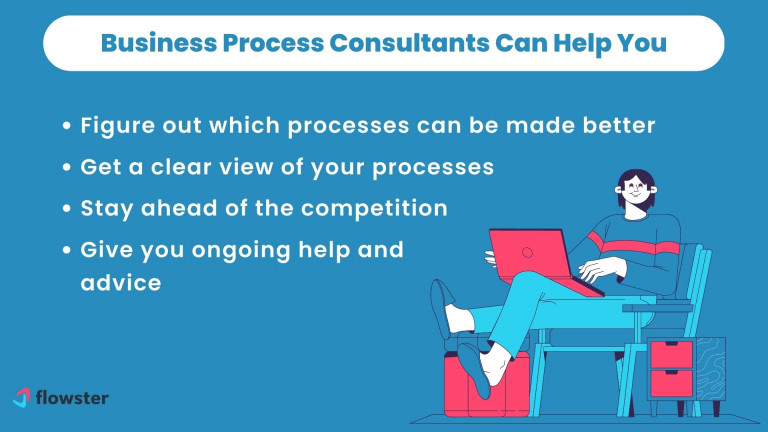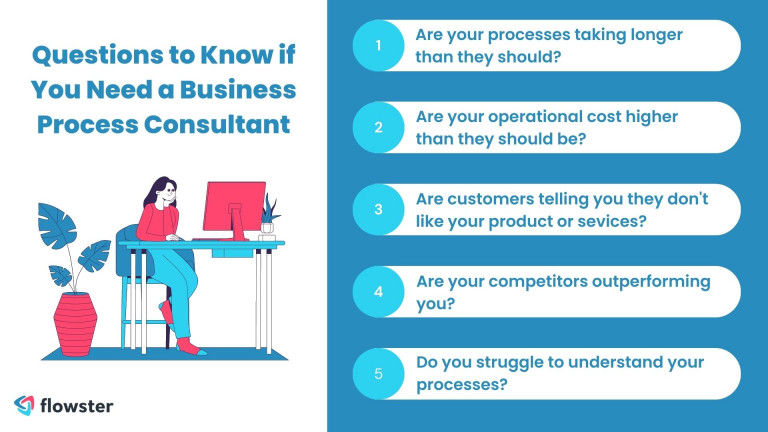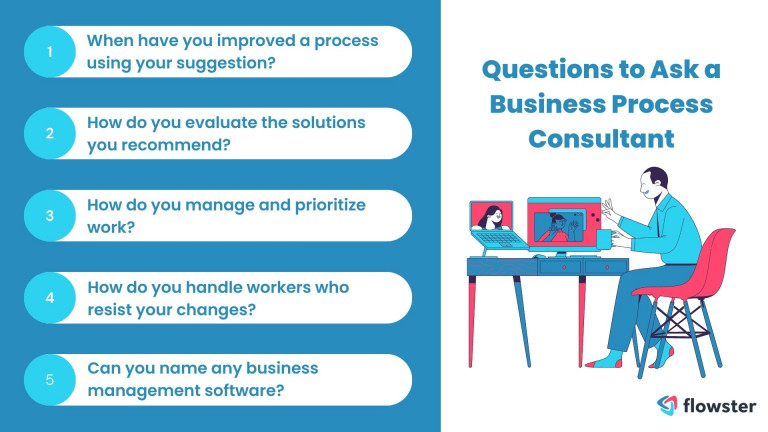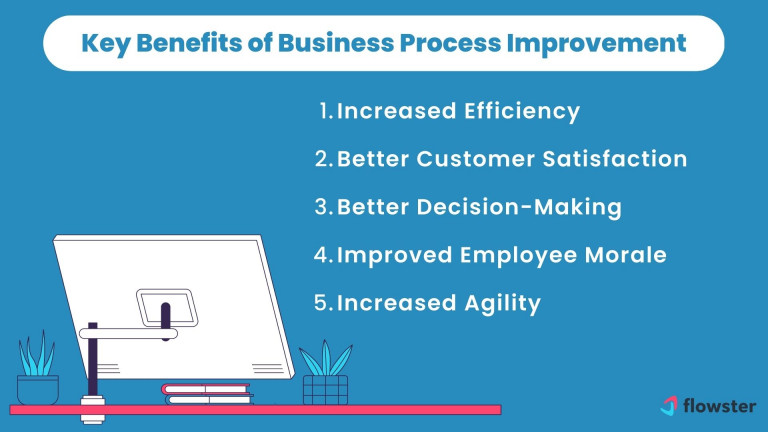Business processes are an important part of any organization because they affect how well it works, how productive it is, and how successful it is.
Still, many businesses find it hard to improve their processes, which can lead to inefficiencies, bottlenecks, and a drop in quality.
That’s where a business process consultant can help.
According to a study by McKinsey & Company, companies that put business process improvement at the top of their list of priorities can see a lot of benefits, such as increased efficiency, happier customers, and lower costs.
The study found that organizations that focused on process improvement saw a 20% increase in efficiency and a 40% reduction in costs.
If you are looking to improve your business processes, a business process consultant can provide valuable insights, guidance, and support.
In this article, we will explore the role of a business process consultant, the benefits of working with one, and what to look for when choosing a consultant.
We will also talk about how to work with a business process consultant and what the most important benefits of business process improvement are.
Finally, we will look at how business process tools can support this process, helping you to achieve your goals and improve your organization’s performance.
Article Outline
What is a Business Process Consultant?
A business process consultant is a professional who can help your organization improve its processes to make them more effective, save money, and make customers happier.
They use a variety of methods and tools to analyze and map your business processes, find ways to improve them and come up with ideas for how to fix them.
A business process consultant’s job is to help you reach your goals and do well in the competitive business world of today.
A Source of Expertise and Experience: Business Process Consultants
Business process consultants bring a wealth of experience and expertise to the table. They have a deep understanding of business processes and the various challenges organizations face.
They use this information to help your organization find areas where it can improve and suggest solutions that will lead to real results.
Business process consultants usually use a systematic approach to process improvement, such as process mapping and analysis, to make sure that all parts of your process are well understood.
This allows them to identify inefficiencies and areas where improvements can be made.
They may also use simulation tools to test different scenarios and find the best solution for the organization.
To put it simply, a business process consultant looks at how your company works now, finds places where things could be better, and then makes changes to make things run more smoothly. This can include anything from re-designing your workflows to automating manual tasks.
The consultant also teaches your employees how to use the new processes and stays in touch with them to make sure the changes work and stay in place.

How Can a Business Process Consultant Benefit Your Business?
There are many benefits to working with a business process consultant. Here are just a few:
Process Improvement
A business process consultant can help you figure out which parts of your processes can be made better and suggest ways to do so. This can help you save time, reduce costs, and improve customer satisfaction.
Increased Visibility
A business process consultant can help you get a clear view of your processes and suggest ways to improve visibility. This can help you identify areas for improvement and make data-driven decisions.
Competitive Advantage
A business process consultant can help you stay ahead of the competition by improving your processes and customer satisfaction. They can help you understand what your competitors are doing and suggest ways to differentiate yourself and stand out in your market.
Support
As you work to improve your processes, a business process consultant can give you ongoing help and advice. They can help you set goals, track progress, and ensure that you stay on track and achieve your objectives.
So, if you have inefficiencies, manual processes, or low employee morale, a business process consultant may be able to improve your processes, give you a competitive edge, make your business more efficient, and make your customers happier.
How to Tell If You Need a Business Process Consultant
There are a number of signs that indicate that your organization may need the help of a business process consultant. If you’re experiencing any of the following issues, it may be time to consider working with one:
To help you figure out if you need a business process consultant, ask yourself the following:

Process Inefficiencies
Are your processes taking longer than they should? Are there bottlenecks or other obstacles that are slowing down your work? If that’s the case, a business process consultant can help you figure out what’s going wrong and suggest ways to fix it.
High Costs
Are your operational costs higher than they should be? A business process consultant can help you find ways to cut costs and improve your business’s bottom line.
Poor Customer Satisfaction
Are customers telling you that they don’t like your products or services? A business process consultant can help you figure out what’s really going on and give you ideas for how to make customers happier.
Competition
Are your competitors outperforming you in terms of efficiency and customer satisfaction? A business process consultant can help you understand why and suggest ways to stay ahead of the competition.
Lack of Visibility
Do you have trouble understanding what’s going on in your processes? A business process consultant can help you get a clear view of your processes and suggest ways to improve visibility.
Therefore, if you are experiencing any of these problems, you might want to think about hiring a business process consultant. They can help you figure out what needs to be fixed, suggest solutions, and help your organization reach its goals.
Interested in improving your business processes?
What Qualifications Should You Look for in a Business Process Consultant?
When searching for a business process consultant, it is important to look for someone with the right qualifications and experience. Here are some key qualifications to consider:
Relevant Education
A good business process consultant should have a strong educational background in business, management, or a related field. A bachelor’s or master’s degree in these areas can give you a solid foundation of knowledge and skills; state-specific university degrees such as Washington D.C. MBA programs further narrow down your search for more qualified candidates, making your hiring process easier and faster.
Industry Experience
Look for a consultant who has experience working in your industry. They should have a good understanding of the unique challenges and opportunities in your market and be able to bring that expertise to your organization.
Certifications
Certifications can be a valuable indicator of a consultant’s level of expertise. Look for certifications from organizations such as the Association for Business Process Management Professionals (ABPMP) or the International Institute of Business Analysis (IIBA).
Technical Skills
A good business process consultant should know a lot about technology and be able to use it to make your processes better. They should have experience with process modeling tools and software, as well as a good understanding of data analysis and visualization.
Communication Skills
Effective communication is critical for a business process consultant. They should be able to explain ideas and solutions that are complicated to people at all levels of your organization.
Project Management Experience
A good consultant should have experience leading projects and work with cross-functional teams. They should be able to make plans, carry out those plans, and finish projects on time and on budget.
As such, if you’re in search of a business process consultant, that person should have a degree, experience in the field, certifications, technical knowledge, good communication skills, and experience managing projects. A consultant with these skills can help your company improve its business processes.
Questions for Interviewing a Business Process Consultant
Choose a business process consultant who will stand out during the interview process by showing a wide range of business knowledge, good communication skills, and a strong analytical mind.
Candidates who lack social intelligence and problem-solving skills should be avoided.
So, here are some interview questions for business process consultants to help you figure out who to hire.

- When have you improved a process using your suggestion? This shows the candidate’s business consulting experience and success.
- How do you evaluate the business solutions you recommend? This shows the candidate’s work ethic, experience, and skill.
- How do you manage and prioritize work? This shows organization.
- How do you handle supervisors and workers who resist your changes? This shows the candidate’s managerial and interpersonal abilities.
- Can you name any business management software? This assesses business management software expertise.
What Is the Process of Working with a Business Process Consultant?
The process of working with a business process consultant typically includes several key steps:
1. Initial Assessment
When you work with a business process consultant, the first thing they will do is look at how your company works. This may involve conducting interviews with stakeholders, analyzing data, and reviewing documentation. The goal of the assessment is to find out how you do things now and where you can make changes.
2. Process Modeling
Once the initial assessment is done, the consultant will use tools and techniques for process modeling to make a map of how your processes work now. This will help identify bottlenecks, inefficiencies, and areas where improvements can be made.
3. Recommendations
The consultant will tell you how to improve your processes based on what they learned from the initial assessment and process modeling. Some of these suggestions could be to change the way the process is designed, to add new technologies, or to use new ways of managing processes.
4. Implementation
Once the consultant has made suggestions, he or she will work with your organization to put the changes into action. This could mean updating process documentation, training employees, and setting up new systems and tools.
5. Monitoring and Review
Once the changes have been made, the consultant will keep an eye on your processes to make sure they are working the way they are supposed to. They will also look at your processes regularly to see if there are any other ways to make them better.
In short, working with a business process consultant means doing an initial assessment, modeling, making recommendations, putting plans into action, and continuing to review and monitor the process. With this method, a consultant can help your company improve its processes and reach its goals.
What Are the Key Benefits of Business Process Improvement?
Improving business processes is a key strategy if you want to stay competitive in the fast-paced business world of today. The benefits of business process improvement can include the following:

Increased Efficiency
Streamlining your business operations by improving your business processes can save you time and money. This can improve efficiency by giving your employees more time to work on more important tasks.
Better Customer Satisfaction
You can improve the customer experience by streamlining your processes and getting rid of bottlenecks. This can make customers happier, which can lead to more sales and more money in the bank.
Better Decision-Making
By gaining a clearer understanding of your processes and the data they generate, you can make better decisions. This can lead to improved performance, increased profits, and reduced risk.
Improved Employee Morale
Improved processes can also make your employees happier. By streamlining processes, cutting down on bureaucracy, and automating repetitive tasks, you can make the workplace a better place to work, which can make employees happier and reduce employee turnover.
Increased Agility
If you improve your processes, you can become more agile, which can help you respond to changes in the business environment more quickly and effectively.
In the end, improving business processes can make them more efficient, make customers happier, help make better decisions, make employees happier, and give businesses more freedom. By investing in process improvement, your organization can stay ahead of the competition and achieve its strategic goals.
Using Business Process Tools to Support Business Process Improvement
One of the most effective ways to support business process improvement is through the use of business process tools. These tools can help you find your processes and analyze them. They can also help you design, implement, and track process improvements.
Some of the key benefits of using business process tools include:
Improved Process Visibility
Business process tools can provide a visual representation of your processes, making it easier to see where improvements can be made. This can help you figure out where you need to make changes quickly, saving you both time and money.
Increased Process Efficiency
By automating tasks that are done over and over again, you can make your processes more efficient and save time and money.
Better Collaboration
Business process tools can provide a central place for people to work together, making it easier for different teams and departments to work together. This can improve communication and reduce the risk of errors and miscommunication.
Improved Process Monitoring
Business process tools can help you monitor your processes in real-time, providing you with a clear view of how they are performing. This can help you quickly identify and resolve any issues, improving process performance.
Increased Standardization of Processes
By making your processes consistent and automating your routine tasks, you can improve the quality and consistency of your work and make it less likely that mistakes or misunderstandings will happen.
Overall, business process tools can provide many benefits for improving business processes. By investing in these tools, your organization can improve efficiency, make it easier for people to work together, monitor processes better, and make sure they are all done the same way. This will lead to a more efficient and effective operation.
Conclusion
In conclusion, a business process consultant can help your organization in many ways. They can help you find and improve processes, make your business more efficient, and make your work better.
To make sure you are working with a qualified consultant, you should look for one with the right qualifications, such as experience and expertise in process improvement and project management.
Working with a business process consultant usually means finding places to improve, analyzing processes, designing ways to improve processes, putting changes into action, and keeping an eye on the results.
Business process tools can help with this process by giving a visual representation of processes, making them more visible and efficient, and making it easier for people to work together.
Lastly, improving business processes can have many benefits, such as making them more efficient, making it easier for people to work together, making it easier to keep track of processes, and making them more similar.
To get these benefits, you need to work with a qualified and experienced business process consultant who has the right tools and resources at their disposal.
We invite you to share your thoughts and experiences on this topic in the comments below. Whether you are a business owner, manager, or consultant, we would love to hear from you and continue the conversation on business process improvement.
Ready to Create Your First Business Process Workflow?
Start from scratch to make a business process workflow, or look through our templates in Flowster’s Marketplace.
Want help? Use our “Done for You” service to let our experts build custom workflows for you.
Related Articles
Would you like to learn more? See our other informative articles.
How Business Process Mapping Helps You Manage and Scale Your Business
What Process Management Tool is Right For You? Flowster vs Alternatives

